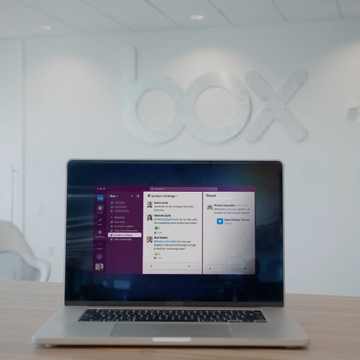What do Shopify, Lyft and Doordash have in common? Stripe, running in the background to facilitate a seamless payment experience.
Founded as an online payment platform in 2011, Stripe now offers a suite of tools and products designed to help millions of companies in more than 120 countries succeed in the digital era. Ever on the front lines engaging with customers, brothers John and Patrick Collison set a precedent when they co-founded Stripe. Throughout the company’s growth, building and maintaining personal relationships with clients have been a priority for its global sales team.
Most of those relationships were originally anchored in face-to-face interactions. But since the Covid-19 pandemic began in March, that’s been near impossible. Thankfully, the Stripe sales team was one of the earliest adopters of Slack Connect, the secure way to communicate and collaborate with outside partners in Slack, the channel-based messaging platform.

‘Historically, the gold standard of a deep relationship in sales was getting the person on text. Now the gold standard is getting them into a Slack channel.’
Over 300 sales team members connect with more than 70 customers in Slack channels, a single place to share files and messages. This helps Stripe:
- Close deals faster by maintaining momentum in a digital world
- Forge meaningful relationships with prospects before, during and after the contract has been signed
- Increase mutual engagement to deliver continued value to the customer
Leading the team that executes the end-to-end customer sales cycle is Jeanne DeWitt Grosser, Stripe’s Head of Americas Revenue and Growth. DeWitt Grosser joined us at Slack Frontiers, our annual conference, and shared how her team leverages Slack Connect to shape a customer experience that’s effective, efficient and uniquely Stripe’s.
‘We want it to feel fundamentally different to be sold to by Stripe,’ she says. ‘It’s been really important to keep a very human element in our sales process and build meaningfully different relationships in Slack.’
Building powerful customer relationships in Slack channels
Slack has been integral to Stripe’s sales process since DeWitt Grosser arrived in 2016, when prospects were mainly startups and developers. ‘We were early Slack Connect adopters,’ says James Dyett, Stripe’s head of global product sales and payments optimisations. ‘A customer suggested it, and then it caught fire within Stripe.’
In fact, in 2019, when Slack CEO and co-founder Stewart Butterfield wrote a blog post about Slack Connect (formerly called shared channels), Dyett chimed in on Twitter to express his enthusiasm for the feature, especially when it came to supporting sales, customers and success teams.

Today, sales teams at Stripe focus on the earliest-stage startups all the way through global Fortune 500 companies, and use Slack Connect to engage with customers, keep communication organised and teams in sync and jump on sales opportunities.
‘You can tell when there’s energy in a relationship – and the deal – and it’s hard to get that over email,’ Dyett says. ‘It used to be in person and over text and phone. Now it’s Slack Connect.’
Maintaining close connections from pre-sale to signed contract
Usually at the beginning of a sale, DeWitt Grosser explains, reps used to double down on communication using the ‘law of 2x.’ Essentially, you start with a meeting and then follow up a week later. But this strategy no longer makes the cut: A lot could change in a week, and Slack is more in line with the tempo of the digital workplace.
‘In Slack channels, the dialogue with the prospect happens in real time, as opposed to the next time you align your schedules,’ DeWitt Grosser says. ‘This kind of personal, persistent connection grows customer loyalty and retention.’
Often sales reps have to communicate with a variety of departments to seal the deal. Instead of emailing them separately and creating silos, Stripe’s account executives and solution architects set up a Slack channel with key customer stakeholders, like developers, the head of payments and a finance representative.
Dyett and his team can quickly follow up on term sheet details and any other contract questions in Slack. ‘These cross-functional conversations happen quite neatly in Slack, which is helpful to avoid miscommunications and the need for long conference calls,’ he says.
To maintain momentum, the team prefers to engage with each other and customers, in Slack. ‘When you need to move quickly, email is not the right format: It’s more formal and responses take longer,’ Dyett says. ‘Slack has super powers. It’s a much better experience.’

‘You can tell when there’s energy in a relationship – and the deal – and it’s hard to get that over email. It used to be in person and over text and phone. Now it’s Slack Connect.’
Setting customers up for success with Slack Connect
To make conversations as valuable as possible (for both sides), Stripe teams align with customers on how they’ll use Slack together. Instead of throwing everyone in the same channel, they’re deliberate about who is involved and how. In addition to the customer, this often includes:
- The sales representative
- The deployment specialist, who manages the product integration
- The deployment engineer, who handles the technical integration
‘We’re really clear on how a customer should use their Slack channel, and include the minimum number of people to ensure they don’t get confused,’ Dyett says. To further manage expectations, the team sets parameters on content and response time.

Stripe has five different Slack channels with one of their largest customers. ‘Some are more topical; others are broader,’ DeWitt Grosser says.
In one of Stripe’s shared Slack channels with this customer, everyone has access to a Google doc with a running agenda, standing topics and a reminder of Slack best practices. ‘That’s been our internal gold standard for how we set things up,’ DeWitt Grosser says.
Stripe recently helped this customer launch a new payment method and ran into a few kinks before launch. The team tried to troubleshoot via email with the customer, but according to DeWitt Grosser, ‘after two email back-and-forths, we flipped the issue over to Slack and had it figured out in five minutes.’
When a conversation isn’t in Slack, things get trickier. ‘It’s so clunky, and gets even worse with phone and text,’ Dyett says. ‘But in Slack, I can easily share and connect with anyone from our customer’s company. That kind of collaboration is just impossible without Slack.’
Using Slack to enhance the Stripe sales experience
Once a rep signs a new customer, the work of building and maintaining an even more valuable relationship begins. ‘Sometimes we’ll have multiple Slack channels per customer to align different teams,’ DeWitt Grosser says. ‘We use Slack for everything from reviewing weekly metrics to working through integration challenges as customers continue to scale.’
This streamlined communication gives Stripe constant visibility into customers’ activity, empowering the company to proactively anticipate their needs. ‘We’re very excited to craft this Stripe sales way, and create a dynamic, bespoke environment for customers,’ DeWitt Grosser says. ‘Slack enables that.’
To learn more about how Slack Connect is unlocking sales for customers around the globe, check out these other stories.
















